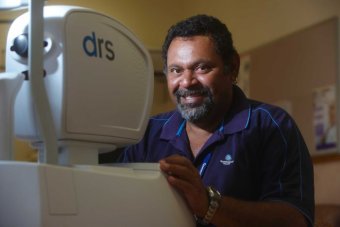A trial to improve the eye health of residents in the Torres Strait has been hailed a ‘revolutionary’ way of closing the healthcare gap in remote areas.
The CSIRO trial involved setting up three portable eye scanning machines across the Torres Strait, to give residents immediate access to free check-ups.
The low-cost cameras took retinal scans, which were sent over satellite to an ophthalmologist in Brisbane for immediate diagnosis.
Usually, residents would have to wait for a visiting ophthalmologist to have their eyes checked, which only happened once or twice a year.
Dr David Hansen from Brisbane’s E-Health research centre said the year-long trial had been a remarkable success.
“We screened over 1,000 people in the trial and we had eight people who actually had to be transported for emergency surgery to stop them from going blind,” Dr Hansen said.
“Potentially those people would have gone blind and we do have people going blind needlessly.”
Dozens more residents were also found with problems including early stage glaucoma and diabetic retinopathy.
Paul Christian from Bamaga in the Torres Strait was one of the first people to have his eyes tested using the new machine.
He said he was shocked when he was told he needed treatment.
“It showed that I had some problems with my blood vessels in the eye, there were a few burst blood vessels,” he said.
“It also showed I have some problems with my cholesterol.
“I didn’t know I had problems with my eyes until I decided to have a look.”
The rate of blindness in Aboriginal and Torres Strait Islander communities is six times that of other Australians but nearly 95 per cent of the cases of vision loss could be prevented or treated.
Dr Hansen said many people were going blind because they were not having their eyes checked regularly.
He said regional areas needed to have access to the same services that were available in the city.
“This can completely revolutionise the way we provide eye health care in Australia,” he said.
“We can actually look to digital technologies to provide equity of access across Australia.”
The researchers have been in talks with Queensland Health to secure a rollout of the technology to other remote areas across the state.


